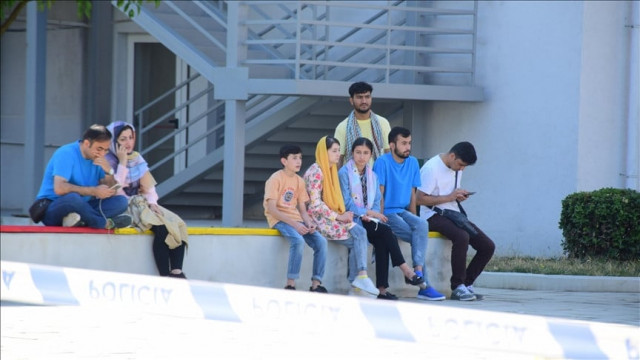'Cruel' action on Afghan refugees in Iran sparks outrage
Videos circulating on social media show Iranian authorities beating and threatening Afghan refugees

Videos circulating on social media showing Afghan refugees being subjected to "cruel" treatment by Iranian authorities at the border and within Iran have sparked widespread outrage.
Since the Taliban took over the country after the US pulled its troops from the war-torn country last year, there has been an increase in the number of Afghans seeking refuge in the neighboring countries.
"Afghans make up one of the largest refugee populations worldwide. There are 2.6 million registered Afghan refugees in the world, of whom 2.2 million are registered in Iran and Pakistan alone," according to United Nations High Commissioner for Refugees (UNHCR) -- a UN agency mandated to aid and protect refugees.
The agency has documented another 3.5 million internally displaced people who have abandoned their homes and have sought refuge within Afghanistan.
"In light of the rapidly deteriorating security situation in 2021, the number of people fleeing will likely continue to rise," said UNHCR.
Videos that recently surfaced on social media have shown Iranian border guards allegedly beating and torturing the refugees.
On April 7, the private Afghan broadcaster TOLO News reported that many Afghans are living in appalling conditions in Iran.
"I went to Iran four months ago. But due to their bad treatment, even with people who had visas, I went to the police and surrendered myself to return to Afghanistan," Sayed Mumtaz, an Afghan refugee, who is now back in Afghanistan, told TOLO news.
Afghanistan shares 921 kilometers (572 miles) of borders with Iran. It runs from the tripoint with Turkmenistan in the north to the tripoint with Pakistan in the south.
"The big problem is lack of residential documents. Many people have recently come to this country," said Nasrullah Kashani, an Afghan refugee in Iran.
Taliban urge Iran to be humane
A spokesperson for the Afghan government, Zabiullah Mujahid, urged Iran to treat Afghans "based on Islamic and neighborly values."
Although the Iranian embassy in Kabul denied the authenticity of one video, there are several other videos and images in circulation
On April 8, Taliban-led Afghan Foreign Ministry raised the issue of misconduct of Iranian officials with Iranian officials.
"Faizanullah Nasiri, the second deputy political minister of political affairs of the Foreign Ministry, met officials from the embassy of Iran in Kabul and discussed the misconduct of the Iranian border forces with the Afghan refugees," said a statement issued in Kabul.
Meanwhile, according to local reports, Iran has denied afghans to work and obtain accommodation.
Afghans in Khost and Kabul have taken to the streets to protest Iran's poor treatment of Afghan refugees.
Quoting Amnesty International campaigner Samira Hamidi, Afghanistan's local Pajhwok News reported that "Iran's border guards point guns towards Afghan refugees at borders and force them to leave their country."
"Reliable sources have confirmed torture of Afghan refugees by border guards of Iran. The footage showing discriminatory and shocking acts of Iranians… is a blatant act of violation of human rights," she added.
Influx begins with Soviet invasion
The Afghan refugee influx, which started in Iran after the Soviet Union invaded Afghanistan in 1979, continued due to the US invasion, civil wars, and instability.
After the Taliban took over Afghanistan, Iran decided to abandon the previous plan to establish refugee camps in border cities to accommodate Afghans fleeing from their country due to the concern that it would trigger migration. It decided to send Afghan refugees stationed on the borders back to their country.
It has been reported that Afghan refugees are living a difficult life in Iran, where they are trying to make a living by working as laborers in many parts of the country.
After the economic crisis in 2018, when former US President Donald Trump reinstated sanctions against Tehran, many Afghan refugees returned to their country.
Observers say that due to the absence of refugee law in Iran, Afghan refugees live without many basic rights. Although Iran hosted Afghan refugees for many years, it did not want to give them citizenship. They said many of the refugees are illegal in the country because they cannot obtain a residence permit.
Iran defends
In various reports published by international human rights organizations, Tehran is accused of sending Afghan refugees to conflict zones in Syria in exchange for residence permits and citizenship.
In an interview with TOLO News, the Iranian Ambassador to Kabul, Bahadar Aminyan, denied the charges of abuse, claiming that there are video clips of incidents involving Afghan refugees in Iran, which number more than 5 million.
Some Afghans are involved in criminal acts, such as the recent instance in which seven Afghans trespassed on an Iranian woman, he said in response to a question about why there is always bad news from Iran about Afghan refugees.
In addition, earlier this month, a stabbing occurred at Imam Reza's shrine in Mushhad province. "We don't know who is exactly involved, but the general environment is unpleasant," the ambassador admitted in response to another question about why Afghans are being blamed for any crime when nothing has been proven.
The ambassador referred to the attacker as a "takfiri," a term used for anti-Shia.
On April 5, an assailant holding a knife at the shrine, which attracts millions of pilgrims each year, killed one cleric and injured two others. The attacker was an immigrant from Uzbekistan who entered Iran illegally in 2021 and has been living in the Mashhad area since.
The ambassador also downplayed a spike in the amount of social media videos directed at Afghan refugees, noting that the majority of them are old and have resurfaced to cause tension.



















COMMENTS
Comments are moderated and generally will be posted if they are on-topic and not abusive.
For more information, please see our Comments FAQ